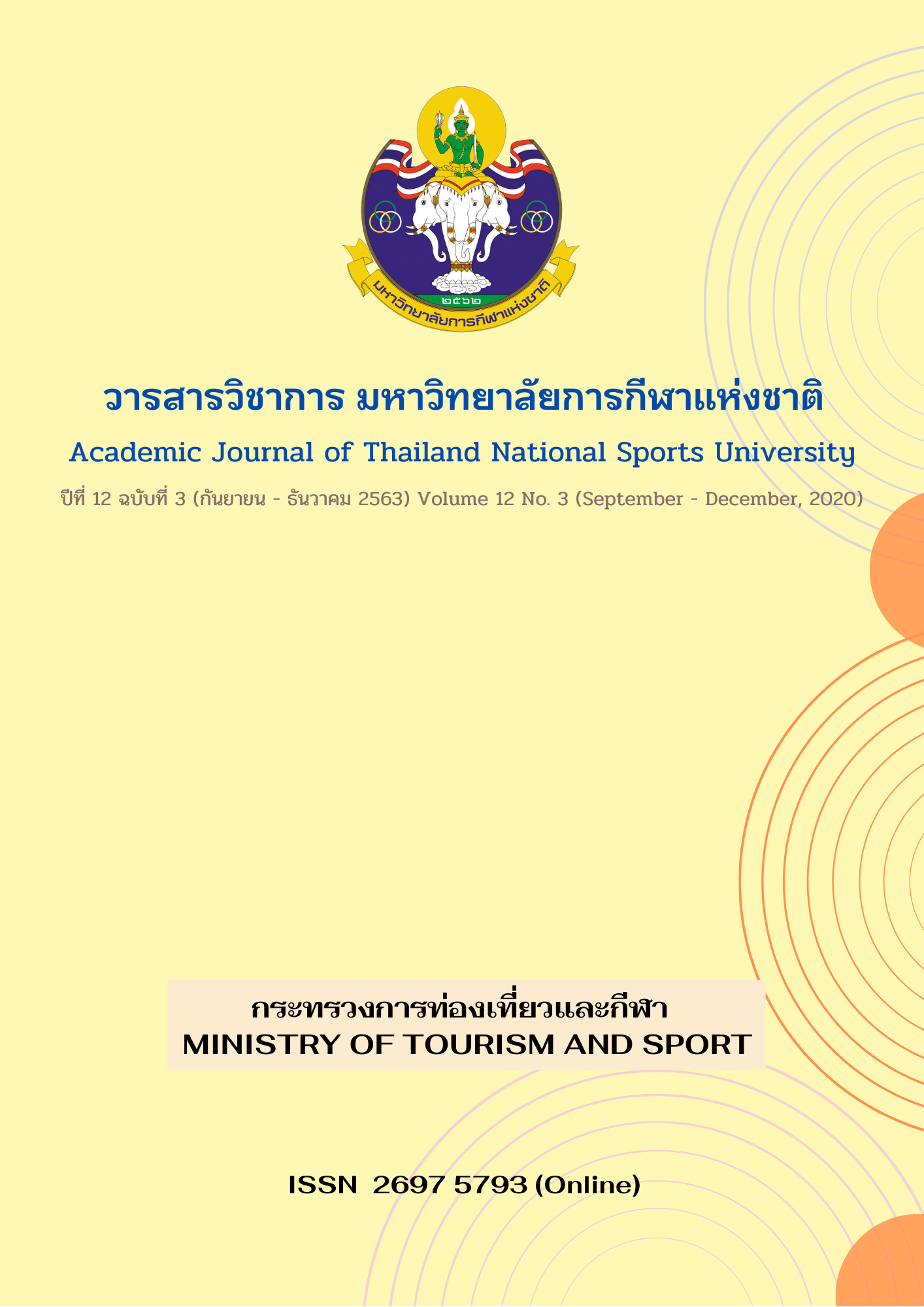DEVELOPMENT OF A UBIQUITOUS EXPERIENCE-BASED INSTRUCTIONAL SYSTEM TO ENHANCE COMPETENCIES ON INFORMATION TECHNOLOGY FOR EDUCATION TEACHER STUDENTS’ AT NAKHON SI THAMMARAT RAJABHAT UNIVERSITY
Main Article Content
Abstract
The purposes of this research were: 1) to develop the ubiquitous experience-based instructional system (UEBIS) to enhance teacher students’ competencies on information technology for education at Nakhon Si Thammarat Rajabhat University (NSTRU), 2) to validate the efficiency of the instructional packages on UEBIS, 3) to study students’ satisfaction toward UEBIS, and 4) to assess and certify UEBIS from the educational experts. The samples used in the study were 1) 10 experts in educational technology and instructional design specialists, 2) 42 teacher students from faculty of education in NSTRU which was obtained by purposive sampling, and 3) 5 educational experts for assessment and verification of UEBIS. The research instrument were 1) the instructional packages on UEBIS, 2) an achievement test, 3) students’ satisfaction questionnaire, and 4) assessment and verification forms for the educational experts. The data were analyzed by the use of percentage, mean, standard deviation, E1/E2 and t-test (Dependent samples). The results revealed that 1) UEBIS consisted of 5 components: 1.1) Context analysis, 1.2) Input factors analysis, 1.3) Learning Process, 1.4) Result, and 1.5) Improvement; 2) the efficiency validation of the instructional packages on UEBIS was found that values of E1/E2 of set learning unit 1-4 were as follows: 80.67/79.33, 80.18/80.33, 81.02/81.00, and 81.75/80.00 respectively which met the criteria of 80/80; 3) The students’ satisfaction toward UEBIS was at a high level; 4)the assessment and verification of UEBIS were highly appropriate by the educational experts.
Article Details
The published article is a copyright of the Academic Journal of Thailand National Sports University. The passage appeared in each article in this academic journal is a perspective of each author which is not related to the journal. Each author is required to be responsible for all components of his/her own article. If there are any mistakes, each author must be responsible for those mistakes on his/her own.
References
Boonyong Sappajak. (2000). The development of experience-based instructional packages on basic computer for architectural technicians for the higher vocational certificate level. (Master’s thesis). Sukhothai Thammathirat Open University.
Chaiyong Brahmawong. (1980). Media system for teaching. Bangkok: Chulalongkorn University.
Chaiyong Brahmawong. (2002). 3rd dimension of education: Dreaming of reality. Bangkok: S.R. Printing Massproduction.
Chaiyong Brahmawong. (2012a). Future of Education in Thailand: Ubiquitous Learning. Bangkok: Office of the Basic Education Commission.
Chaiyong Brahmawong. (2012b). Operating training manual integrate tablet to enhance teaching and learning. Bangkok: Office of the Basic Education Commission.
Chaiyong Brahmawong. (2013). Research and Development of Educational Innovation. Nonthaburi: Sukhothai Thammathirat Open University.
Chiu, P.S. et al. (2008). A meaningful learning based u-learning evaluation model. Eighth IEEE International Conference on Advanced Learning Technologies, 77-81.
El-Bishouty, M.M., Ogata, H., & Yano, Y. (2008). A model of personalized collaborative computer support ubiquitous learning environment. Tokushima: Department of Information Science and Intelligent Systems, The University of Tokushima.
Jones, V. and Jo, J.H. (2004). Ubiquitous learning environment: An adaptive teaching systemusing ubiquitous technology, beyond the comfort zone. Proceedings of the 21st, 468-474.
Junqi, W., Yumei, Liu. and Zhibin, Liu. (2010). Study of instructional design in ubiquitous learning. Second International Workshop on Education Technology and Computer Science, 518-523.
Krejcie, Robert V. and Morgan, Daryle W. (1970). Determinining sample size for research activities. Educational and Psychological Measurement, 30, 607-610.
Ministry of Education. (2011). Master Plan for Information and Communication Technology for Education. Bangkok: Office of the Permanent Secretary for Education.
Morris, I. D., & Connelly, A. (2010). Involving students in the development and evaluation of a ubiquitous learning application for design practice setting. An International Journal, 21-38.
Office of the Education Council. (2009). Summary of 9 years of educational reform (1999-2009). Bangkok: V.T.C communication.
Office of the Education Council. (n.d.). Teacher professional development. Retrieve from http://admin.e-library.onecapps.org/Book/544.pdf
Saccol et al. (2011). Mobile learning in organizations: Lessons learned from two case studies. International Journal of Information and Communication Technology Education (IJICTE), 7(2011), 11-24.
Skonwan Paruang. (2011). Development of information and communication technology competency of education student. (Doctoral dissertation). Chulalongkorn University.
Suwisa Laokerd. (2015). The development of virtual community based learning system to improve knowledge and competency of educational innovation and information technology for the teacher students in public higher education institutions. (Doctoral dissertation). Mahasarakham University.
Watjanarat Kuandee and Namon Jeerungsuwan. (2015). Thai education reform to develop skills in the 21st century. Develop Study Techniques Journal, 27(93), 12-20.
Yahya, S., Ahmad, E. and Jalil, K. (2010). The definition and characteristics of ubiquitous learning: A discussion. International Journal of Education and Development using Information and Communication Technology, 117-127.


